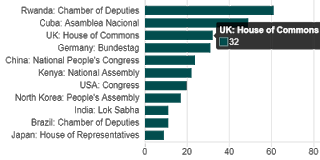 Photograph: Daily Mail.
Photograph: Daily Mail. Dr Bawa-Garba is a Paediatrician who has worked in Leicester Royal Infirmary Hospital.
The Uniform and Dress Code Policy in University Hospitals of Leicester NHS at the time clearly recognised purposes, and principles of the policy one of which is:
"Ensuring that the individual promotes a clean, smart professional appearance, building public trust, confidence and promoting a positive image for the Trust - First Impressions Count as stated in the Caring at its Best standards and UHL Values."
Many doctors, in many medical disciplines, do not wear uniforms at work because uniforms decrease trust and rapport with their patients.
In mental health setting, for example, research has shown that wearing of uniforms (including religious) is associated with with poorer compliance with medication, increased violence, unauthorised absences from the hospital and more deaths from suicides.
However, Department of Health refused, now for twenty years, to make a national policy on workwear and left it to the local NHS trusts to create them. This led to loss of many lives.
The Uniform and Dress Code Policy in University hospitals of Leicester NHS (2010):
"7.8 Female members of staff who for religious reasons need to cover their hair and neck by the wearing of a dark coloured scarf are permitted to do so. The material must be able to withstand a 60 degree mechanical wash".
The medical regulator, the General Medical Council, condemned research by Dr Helen Bright on approachability of social worker wearing religious uniform (Christian) in mental health setting as serious professional conduct. The research has been published HERE.
Dr Bawa Garba had unblemished record until 18th February 2011 when she returned from maternity leave to her work as Registrar in Paediatrics. Her department was understaffed: short of two doctors and a nurse, IT did not work, and staff did not inform her when some of the results of investigation arrived.
A child, Jack Adcock, who had Down's Syndrome, was admitted following illness lasting two days. He had vomiting, diarrhoea, and difficulty breathing. His GP prescribed only one medication Enalapril following cardiac surgery in the past. Dr Bawa-Garba wisely stopped it. Enalapril has serious potential side effect i.e. cardiac arrest. This fatal side effect is more likely to occur when patient is already hypotensive and/or having abnormal levels of electrolytes in his blood.
Down's syndrome causes many impairments in the immune system, and has much higher susceptibility to death from sepsis. The most common infections in this syndrome are those of the lower respiratory tract. These are more severe and frequent than in normal population.
Additionally, there is evidence of greater sensitivity to some drugs leading to increased mortality rate.
In the case of Jack Adcock, it was claimed by experts, there was evidence of sepsis and changes in blood biochemistry that demanded faster response.
Enalapril can cause electrolyte abnormalities such as raised potassium which can be fatal causing heart attack. This means that even if there are staff shortages the chances of successful resuscitation are very much diminished unless it is recognised.
There is description of one successful resuscitation hyperkalaemia case in scientific literature which involved haemodialysis, but patient was not on Enalapril and did not have Down syndrome. There is no public information of the details of what "crash team" decided to do when cardiac arrest occurred. Because Enalapril was given by mother without Dr Bawa-Garba prescription there would be no medical record of it on the prescription chart when resuscitation team arrived. In other words, there was no record and it was not because Dr Bawa-Garba had poor record keeping skills..
In review of this case hospital found numerous failings in the system and some in Dr Bawa-Garba. About 90 recommendations were made.
After criminal proceedings, GMC's tribunal imposed on Dr Bawa-Garba a suspension of her registration for a period of one year. This sanction was overturned by the High Court on GMC's application for the sanction of erasure.
Crown Prosecution Service was reluctant to prosecute initially. But experts at coroner's inquest claimed there was a case of manslaughter by Dr Bawa-Garba. Coroner stated that Enalapril played part in the death of Jack adcock. A two year prison sentence was imposed on Dr Bawa-Garba and suspended for one year. Her appeal was unsuccessful.
During the sentencing process it was stated that Dr Bawa-Garba had a child with autism, a condition of high heritability.
It has been suggested in one theory that autism may stem from problems with prediction.
" In Ayaya’s telling, her autism involves a host of perceptual disconnects. For example, she feels in exquisite detail all the sensations that typical people readily identify as hunger, but she can’t piece them together. “It’s very hard for me to conclude I’m hungry,” she says. “I feel irritated, or I feel sad, or I feel something [is] wrong. Information is separated, not connected.” It takes her so long to realise she is hungry that she often feels faint and gets something to eat only after someone suggests it to her."
In the same article later on an experiment is described on how autistic person reacts to change:
"Last year, for example, Lawson and her colleagues brought two dozen people with autism and 25 controls into the lab. They played a high or low beep, showed a picture of a face or house, and asked participants to press a button for ‘face’ or ‘house.’ At first, a high tone presaged a house 84 percent of the time, then a low tone did, then tones had only a 50-50 relation to image type, and so on. The controls slowed down whenever a run of violated expectations convinced them that the rule must have changed, but the participants with autism responded at a more consistent rate, which was slightly slower overall. The researchers concluded that the participants with autism responded as if each deviation — a house when the tone augured a face, say — signalled a change of rule, whereas typical people were inclined to write off the first few deviations as probabilistic happenstance".
In her evidence Dr Bawa-Garba said that normally blood results are on computer screen and abnormal results show in red. The day Jack Adcock was admitted IT system failed and she eventually got results over the telephone and although she wrote them down she did not quite realise their significance. The rule what is normal and what is not in blood results does not change based on the system of delivery. Of course, it is possible to mishear but that was not the claim. The reference range for each result has to be checked if not known by heart. Dr Bawa-Garba with two other doctors looked after patients on six wards and four floors. She had to keep calling the lab for all patients' lab. results.
It was alleged that she did not pay adequate attention to blood results such as raised serum lactate. However, and more importantly, there was no scientific evidence on blood lactate levels and its correlation to mortality in children at the time of Jack Adcock's admission. It was a contraversial and unsettled issue. It was only in April 2011 (about two months after patient's death) that Kama Ran Jat et al. study on the subject was published in Indian Journal of Critical Care Medicine with title:
Serum lactate levels as the predictor of outcome in pediatric septic shock
" Nonsurvivors had higher blood lactate levels at admission as well as at 12 and 24 h. A lactate value of more than 45 mg/dl (5 mmol/l) was a good predictor of death."
It is not clear from the information in the public domain on what scientific evidence Dr Bawa Garba was judged because no actual data was included in determinations or judgements, There is no mention on what evidence expert could claim with any degree of confidence how likely Jack Adcock was to survive. There was no such data at the time of patient's death according to the above paper. The coroner's inquest was in 2013 when two experts blamed her for the Jack Adcock's death despite the fact that following her initial treatment of him patient recovered enough to be fully alert and even smiling.
Corrected punctuation errors in judgement from Court of Appeal make significant difference in the meaning. Enalapril as well as Down Syndrome can cause coughs, colds and resulting breathlessness:
4. The case concerns the care and treatment received by Jack Adcock, a six year old boy (born on 15 July 2004), who was diagnosed from birth with Downs Syndrome (Trisomy 21). As a baby, he was treated for a bowel abnormality, and a "hole in the heart" which required surgery as a result of which he required long-term medication called enalapril.
Enalapril manufacturer produces Patient Information Leaflet. It was mother's duty to follow it and she did not. It states that in case of diarrhoea it should not be given without consultation with doctor. Why was there assumption by patient's mother that Dr Bawa-Garba did not prescribe medication to her son competently? Lack of trust, and/or prejudice?
The fact that Dr Bawa-Garba confused Jack Adcock at the time of his resuscitation with another child who had cardiac arrest earlier in the day is not a reflection of her incompetence but grief. Visual hallucinations are known to occur in normal people in grief situation. She quickly, within seconds, corrected herself and it had no impact on the outcome of the case.
Doctors are exposed to the high degree of psychological trauma. One of the consequences is re-experiencing of the traumatic event when reminder occurs.























